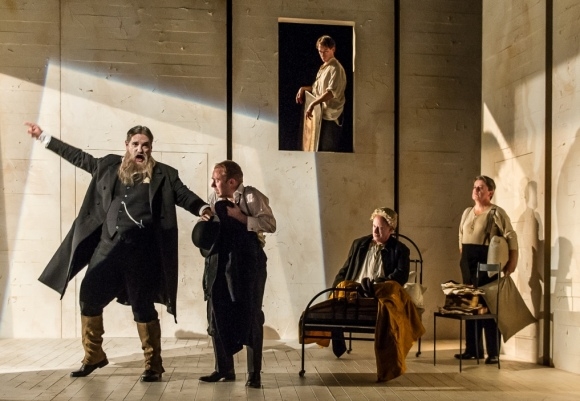The Trial (Royal Opera House)
Music Theatre Wales has commissioned Philip Glass and Christopher Hampton for its latest operatic project

© Clive Barda
Glass’s shortcoming as an opera composer is a tendency to knit narrative fragments together rather than build drama and amplify character through musical development; yet, oddly, in Kafka’s world of unexplained arrest and unfathomable bureaucracy this dramatic inertia is almost a strength.
He is both helped and hindered by Christopher Hampton‘s eloquent libretto – helped because the text oils the wheels of his score with a literate wit, hindered because it appears to have mesmerised Glass into letting words fuel his motor rather than notes. Time and again during The Trial‘s 140-minute duration I longed for the verbiage to dry up so that Glass could propel the drama through music. It never happened.
Kafka’s mordant satire tracks the downfall of Josef K, a bank official who is accused by an indeterminate authority of having committed an unspecified crime. Designer Simon Banham‘s box set, which contrives simultaneously to enclose and expose K like a mouse in a laboratory, is as bleak as the tale it serves, and director Michael McCarthy peoples this space with cartoon-like archetypes whose lack of definition makes it impossible for the accused man to communicate with them usefully.
'fleeting moments of invention and beauty'
An eight-strong cast compounds the alienation by doubling roles, an economy that enhances K’s dislocation. There’s a morbid fascination in charting his descent from confident young professional through reversion to childhood to ultimate annihilation, and Johnny Herford interprets the role with as much flair as the music allows, singing and inhabiting the doomed young man with complete conviction.
Michael Bennett and Nicholas Folwell open the opera as guards à la Hergé’s Tintin, bowler-hatted and moustachioed Thomson & Thompson to the life, with Folwell later delivering the opera’s most extended lyric episode when he plays the priest who 'explains' the law to K.
An assortment of other two-dimensional characters also cross his path in the safe hands and lyrical tones of Michael Druiett, Gwion Thomas and an especially dynamic Paul Curievici, while Amanda Forbes and the vocally rounded mezzo Rowan Heller deal well with Kafka’s casual misogyny in the female roles.
Michael Rafferty, the conductor and co-artistic director (with McCarthy) of Music Theatre Wales, is at pains to accentuate those moments in the score where the music has a twinkle in its eye, and his 12-piece ensemble responds poetically to its many fleeting moments of invention and beauty. In their collective hands the opera seems to coalesce into more than the sum of its parts.
Music Theatre Wales's production of The Trial plays at the Linbury Theatre, Royal Opera House until 17 October, then tours to Manchester, Aberystwyth, Oxford, Basingstoke, Cardiff, Mold and Birmingham.












